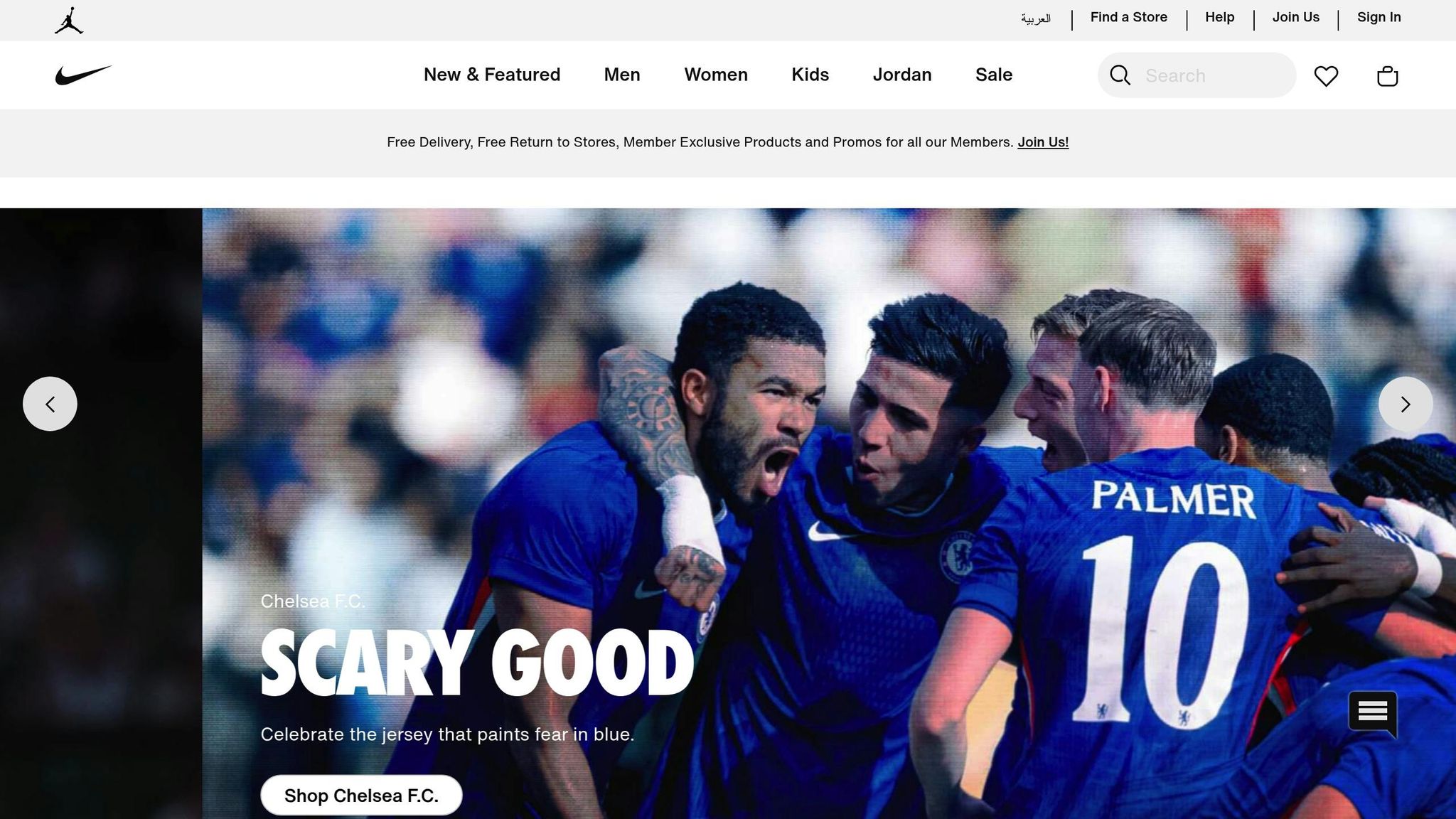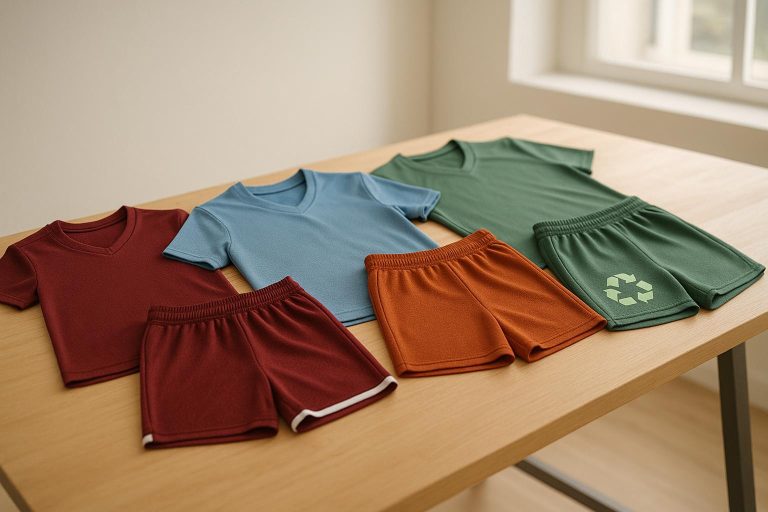Recycled polyester (rPET) is gaining popularity for team uniforms due to its performance, durability, and reduced environmental impact. Made from plastic bottles, it uses 59% less energy and cuts CO₂ emissions by 32% compared to virgin polyester. Teams benefit from moisture-wicking, quick-drying, and long-lasting fabrics that stay vibrant season after season. While initial costs may be higher, the material’s durability reduces long-term expenses. Look for certified suppliers to ensure quality and responsible sourcing. Recycled polyester uniforms are a practical choice for teams aiming to combine performance with eco-conscious practices.
The Making of Nike Football National Team Jerseys

Environmental Benefits Checklist
When considering recycled polyester for team uniforms, it’s essential to understand how this choice contributes to environmental goals. Opting for recycled materials offers benefits that go far beyond just the game.
Reducing Plastic Waste
Recycled polyester addresses a major environmental issue by turning plastic waste into athletic wear. 99% of recycled polyester comes from PET bottles, with only 1% sourced from wasted polyester fabrics, ocean debris, and pre-consumer scraps. Choosing recycled polyester uniforms helps divert plastic bottles from landfills and oceans, transforming waste into something useful.
In 2023 alone, 8.9 million tonnes of recycled polyester were produced – each uniform represents dozens of repurposed bottles.
“Recycled polyester, often called rPet, is made from recycled plastic bottles. It is a great way to divert plastic from our landfills. The production of recycled polyester requires far fewer resources than that of new fibers and generates fewer CO2 emissions.” – SustainYourStyle
Teams aiming to make a bigger environmental impact should look for certifications like Recycled Claim Standard (RCS), Global Recycled Standard (GRS), and OEKO-TEX Standard 100 when selecting uniform providers.
Beyond reducing waste, recycled polyester also conserves critical resources.
Lower Resource Usage
Recycled polyester significantly cuts resource use compared to virgin polyester production. It reduces water consumption by 90%, requires 59% less energy, and lowers CO₂ emissions by up to 60%.
For teams mindful of their environmental footprint, these savings add up. A single set of uniforms made from recycled polyester can conserve substantial amounts of water, energy, and carbon emissions when compared to traditional materials.
Supporting Circular Economy
Recycled polyester also plays a role in advancing a circular economy by reusing waste instead of relying on the traditional take-make-dispose model. This material cuts down dependence on petroleum-based raw materials and promotes the ongoing use of polyester fibers within production systems.
By choosing recycled polyester uniforms, teams contribute to a system that prioritizes reuse. For example, polyester yarn made from textile waste reduces environmental impact by 23% compared to virgin polyester yarns. Teams can amplify their contribution by selecting uniforms designed for durability, reducing the need for frequent replacements.
The Higg MSI assessment highlights that mechanically recycled polyester outperforms generic polyester across all measured impact categories, including global warming, water scarcity, resource use, and chemical impact. Durable and sustainable, these uniforms are a step toward smarter consumption and a healthier planet.
Performance and Durability Assessment
Recycled polyester combines eco-conscious production with the performance athletes need. For teams considering this material for their uniforms, the question often arises: does sustainability compromise performance? The answer is a resounding no. Recycled polyester offers the same high-performance features as virgin polyester, with added benefits that athletes will appreciate.
Athletic Performance Features
When it comes to performance, recycled polyester holds its own against virgin polyester in all the key areas that matter for sports teams. In fact, it often outshines its traditional counterpart in comfort. Recycled polyester is known for being softer, more breathable, and quicker to dry – qualities that are especially important during high-intensity activities. The stretch and moisture-wicking properties that make synthetic athletic wear so popular remain just as effective in its recycled form.
For teams practicing in hot, humid regions of the U.S., these enhanced features make a noticeable difference. Improved airflow and breathability help regulate body temperature during summer games and practices, keeping players cool even when the thermometer climbs past 90°F. Beyond comfort and performance, recycled polyester also offers impressive durability, ensuring uniforms last through season after season of use.
Long-Term Durability
One common concern about recycled materials is their durability. However, recycled polyester proves to be just as tough and long-lasting as virgin polyester. It retains its strength and color vibrancy over time, ensuring that team uniforms stay bold and dependable for multiple seasons.
What’s more, recycled polyester can be reprocessed multiple times without losing quality. The fabric’s durability is also influenced by factors like stitch density and knitted structure, meaning well-constructed uniforms with reinforced seams can stand up to the demands of frequent use. Studies even show that recycled polyester resists wear better after aging compared to standard materials. This makes it an excellent long-term investment for teams that train and compete regularly.
Outdoor Weather Protection
Sports teams often face unpredictable weather, and recycled polyester is up to the challenge. Its lightweight, moisture-wicking properties excel in hot conditions, pulling sweat away from the skin and allowing it to evaporate quickly. This keeps athletes dry and comfortable, even during intense summer practices. Additionally, the fabric resists fading and holds up against harsh UV rays, ensuring uniforms look sharp despite prolonged exposure to the sun. For teams in sunny states like Arizona, Florida, or California, this durability is a major plus.
While recycled polyester isn’t as breathable as natural fibers like cotton or linen, this can actually be an advantage in cooler weather. By retaining body heat, it provides insulation during fall and winter sports, making it a versatile option for year-round athletic activities. Whether it’s scorching summer heat or brisk autumn winds, recycled polyester delivers reliable performance in a variety of conditions.
sbb-itb-4d95ad3
Cost and Supply Chain Analysis
Evaluating the financial and logistical aspects of recycled polyester uniforms is essential for making smart decisions. While eco-friendliness is a priority, teams must weigh environmental gains against budget limits and dependable delivery timelines.
Team Cost Efficiency
Cost is a major factor when choosing recycled polyester uniforms. Although the upfront expense may be higher due to rising raw material prices, the long-term benefits are worth considering. Recycled polyester is significantly less expensive than natural fibers, and its production uses 59% less energy compared to virgin polyester. This energy efficiency, combined with the material’s durability, means uniforms often last through multiple seasons, reducing replacement costs. As global oil and petroleum prices drive up the cost of virgin PET plastic, recycled polyester becomes an even more budget-friendly option over time.
Supply Chain Reliability
The recycled polyester market is on the rise, growing to $15.52 billion in 2024 and expected to hit $26.18 billion by 2030. This growth reflects the industry’s dedication to sustainability but also highlights supply chain hurdles. Limited PET bottle collection and high processing costs remain challenges, emphasizing the importance of suppliers with diversified sourcing strategies. According to the Textile Exchange, the demand for recycled polyester is set to increase from 14% to 45% by 2025, requiring 17.1 million metric tons of material. To meet this demand, some companies are adopting RPET (recycled PET) and launching bottle recovery programs, while others turn to pre-consumer scraps and surplus fabrics. Teams partnering with suppliers who have varied sourcing methods can better navigate these challenges. Notably, the Asia Pacific region accounted for 47.78% of recycled polyester revenue in 2024, making it a key player in the market.
Bulk Orders and Customization Options
Recycled polyester uniforms are ideal for bulk orders, offering both customization and cost efficiency. Teams can choose from several design methods, such as sublimation for bold graphics, screen printing for straightforward designs, or twill for durable, textured lettering. However, slight adjustments may be needed for consistent color finishes depending on the base material. For large orders, comparing quotes from multiple suppliers and negotiating terms can lead to better deals, especially for larger organizations. It’s also wise to check production schedules to accommodate tight deadlines. Reviewing fabric samples and ensuring certifications can help match order quantities to team needs without overstocking. In 2024, the apparel sector dominated the recycled polyester market, contributing 51.32% of its revenue.
Selecting the Right Uniform Provider
Picking the right uniform provider is essential when aiming to combine sustainability with top-notch athletic performance. A supplier who understands the benefits of recycled polyester can make all the difference. When it comes to recycled polyester uniforms, evaluating a provider’s expertise, certifications, and dedication to sustainable practices is crucial. Your choice will directly influence both the quality of the uniforms and their environmental impact.
Evaluating Supplier Expertise
When selecting a uniform provider, prioritize those who specialize in custom team uniforms and offer recycled polyester options. Providers with experience in sustainable manufacturing can ensure proper handling of recycled materials, which is critical to maintaining both performance and eco-friendly standards.
Look for suppliers with relevant certifications like Fair Trade, GOTS (Global Organic Textile Standard), and OEKO-TEX. These certifications confirm that the provider adheres to environmental and ethical production standards. Additionally, the supplier should demonstrate familiarity with key industry requirements, such as fire resistance, UV protection, and moisture management. This ensures the uniforms meet safety and performance standards for athletic use.
Transparency is another vital factor. A trustworthy supplier should provide clear documentation on sourcing and sustainability practices. This transparency allows you to verify that the uniforms truly deliver the environmental benefits you’re seeking.
When discussing your needs with suppliers, confirm the recycled polyester content, labeling, and any specific team requirements. A reliable provider will maintain stringent quality control to ensure the fabrics meet standards for durability, comfort, and performance.
“RPET fabric isn’t just a textile – it’s a powerful environmental solution that transforms yesterday’s plastic waste into tomorrow’s fashion, giving new purpose to materials that would otherwise pollute our planet.” – Yardblox.com
Now, let’s take a closer look at how Wooter Apparel measures up.
Wooter Apparel Services

Wooter Apparel stands out by offering high-quality custom uniforms with sustainable options. With a 4.9-star rating from 1,237 reviews, they’ve earned a strong reputation for delivering exceptional uniforms across sports like basketball, football, baseball, softball, and soccer.
One of their key features is their self-serve apparel platform, which allows teams of all sizes to order without minimum quantity requirements. Teams can either submit their own designs or choose from Wooter’s in-house design services. Customization options include sublimation, tackle twill, and embroidery.
Pricing starts at $39.99 for basketball sets, $59.99 for football sets, $49.99 for baseball/softball sets, and $27.99 for soccer sets. Individual jerseys are available for roughly half the price of full sets.
Wooter also offers efficient production timelines, with standard delivery times of 20–25 business days. Rush orders (15–18 business days) are available for an additional fee starting at $350 or 20% of the order total.
Customer service is another area where Wooter excels. Support is available via live chat, phone, and dedicated account managers. Customer testimonials frequently highlight both the quality of the uniforms and the exceptional service provided:
“Great company, uniforms were awesome and the customer service was even better. The uniforms are very well made and of great quality…” – Jason P.
“Highly recommend. Jerseys were delivered in exactly 3 weeks. Great quality. Excellent customer service. Albert Chi really went above and beyond to meet our needs.” – Sarah J.
For teams interested in recycled polyester options, Wooter Apparel encourages direct communication to discuss sustainability needs and available eco-friendly materials. Their expertise in handling bulk orders and custom designs makes them an excellent choice for teams looking to prioritize sustainability without compromising quality or customization.
Making Your Final Decision
When weighing your options, it’s essential to consider a few key elements: environmental impact, performance needs, and long-term cost efficiency. Recycled polyester offers a notable advantage here – it reduces carbon emissions by 30–50% and uses 59% less energy compared to virgin polyester. This makes it a strong choice for organizations aiming to align sustainability goals with budgetary considerations.
On the performance front, recycled polyester holds its own against virgin polyester. It matches in durability, moisture-wicking properties, and resistance to wear and tear. While the upfront cost might be higher, the material’s longevity can significantly reduce the need for replacements, potentially cutting costs by up to 30% over time. With post-consumer PET priced at 16.44 cents per pound as of May 2025, it also allows for more predictable budgeting.
A dependable supply chain is another crucial factor. Consistent access to recycled materials not only ensures steady production but also mitigates risks tied to oil dependency and geopolitical uncertainties. Additionally, sourcing recycled materials benefits from expanding recycling networks and certifications like GRS, GOTS, or RWS, which verify responsible sourcing practices. To further ensure accountability, always request Transaction Certificates with each shipment. For added versatility, blending recycled polyester with fibers like cotton or elastane can fine-tune performance to meet specific athletic demands.
The market is already moving in this direction. By 2023, 13% of all polyester fibers globally were recycled, and 73% of consumers expressed a preference for environmentally conscious brands. If your organization prioritizes sustainability and values durable, high-performance athletic wear, recycled polyester uniforms present a forward-looking choice that balances athletic functionality with environmental responsibility.
FAQs
Is recycled polyester more cost-effective for team uniforms compared to traditional materials?
Recycled polyester can often save money in the long run compared to traditional materials. Its durability means uniforms last longer and don’t need to be replaced as often. Plus, producing recycled polyester requires roughly 30% less energy than virgin polyester, which helps keep production costs manageable.
Another advantage is that recycled polyester is made from waste materials instead of crude oil. This makes its pricing less dependent on volatile oil market changes, offering potential long-term savings. By opting for recycled polyester, teams can get high-quality uniforms that are both cost-effective and environmentally responsible.
What certifications ensure recycled polyester uniforms are high-quality and sustainable?
When picking out recycled polyester uniforms, make sure to check for certifications such as the Global Recycled Standard (GRS) and the Recycled Claim Standard (RCS). These labels guarantee that the materials meet rigorous standards for quality and environmentally responsible production, ensuring the uniforms are built to last while being sustainably made.
Opting for certified products allows teams to back eco-conscious practices without sacrificing durability or style on the field.
Is recycled polyester just as effective as virgin polyester for team uniforms in different weather conditions?
Recycled polyester holds up just as well as virgin polyester in various weather conditions and even brings some extra perks to the table. It maintains its moisture-wicking abilities and durability, making it a solid choice for demanding activities, especially in hot or outdoor settings. Plus, it tends to have better wear resistance over time, meaning it can keep up with heavy use without breaking down.
A standout feature of recycled polyester is its environmentally friendly production process, which cuts down significantly on greenhouse gas emissions compared to virgin polyester. While it might not be as breathable as natural fibers, its capacity to keep athletes dry and comfortable makes it a dependable and greener option for team uniforms.

